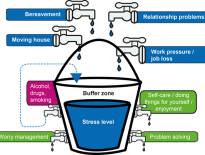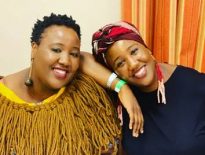Charlene Sibanda – determined to make a real difference
Throughout Black History Month we are celebrating the achievements of black colleagues within our Trust
Through her new role Charlene Sibanda aims to help reduce health inequalities and create an outstanding culture
Charlene Sibanda is our health and wellbeing practitioner (BAME)
“To me Black History Month means being able to acknowledge and embrace the efforts of black people in the UK.
“I often feel we’re washed out by media coverage. If it’s a positive story often a black person is simply described ‘British’. Conversely, if it’s a negative story the black person’s ancestral heritage will be emphasised – so instead of being ‘British’ they’re suddenly ‘Ethiopian’, for example. It’s frustrating, but I try to set this aside and just focus on the hard work and talent black people contribute to this nation.
“This month it’s important to shine a light on things that happened in the past, like the slave trade, so they’re not forgotten.
“I feel like Black History Month is the only time of year I can be proudly black, at other times of year I think about how black I want to present myself and my culture as a young black woman in Britain.
“I was born in Zimbabwe. My dad’s side of the family is from Malawi and my mum’s is from South Africa. I lived both in Zimbabwe and South Africa up until the age of 9, and moved to Luton in 2004 to join my mum and uncle who had moved here a few years prior.
“My mum raised me as a single parent and typically worked two jobs at a time, with unsociable hours, to make ends meet and look after us here as well as the family back home. I remember even at that young age being in awe and complete admiration of the sacrifices that she made and just how hard she worked at everything to ensure that I had the best upbringing she could provide and never lacked anything.
“Now when I look back, I often think that it was from these early ages that the notion of working hard and being a strong independent black woman was slowly ingrained in me, and when I look at my life now (though it’s by no means perfect) I feel it embodies all of my mother’s conscious and unconscious teachings.
“As a kid due to the circumstances at the time, we moved around a lot and it was in meeting various people from differing walks of life that affirmed to me that I want to be in a career that would enable me to help others, though I wasn’t sure at the time what that would look like. When a potential career path started to look more clearer, I decided to study Psychology at college, which lead me to studying it further at BSc level at the University of Northampton.
“Straight after graduating my undergraduate degree in 2015 I went on to do my Master’s degree in MSc Clinical Applications of Psychology at Kingston University. After completing my studies I briefly worked as an Assistant Psychologist, then as a Mental Health Care Assistant at a private medium secure forensic hospital for 18 months. I left that job at the end of 2018 to join the Trust at a Trainee Psychological Wellbeing Practitioner for the IAPT service and trained at Sheffield University .
“This role as health and wellbeing practitioner for the BAME workforce came about due to the Covid-19 NHS Charities Together appeal. Health inequalities have made us more vulnerable to the Coronavirus and it’s important to have specialised support that is sensitive to cultural differences.
“So I’m around to be there for colleagues, to look after mind and body, really listen to their issues and help make changes across the Trust. The creation of my role creates a space where we are able to be ourselves, and be seen as equals rather than being defined by our BAME characteristics. It acknowledges the health inequalities that, for example, Coronavirus exacerbates.
“I’m happy to be in this role that is allowing BAME colleagues to shine and be acknowledged. It’s also a good opportunity for non-BAME colleagues to understand our experiences. Within the BAME community itself there is a chance for us all to understand each other’s experiences. It’s a great opportunity for learning and understanding all round.
“I’m determined to reduce health inequalities and help create an outstanding culture of equality and diversity both in our Trust environment and beyond.
“My current role came around at a very important time. We’re in the midst of the Black Lives Matter movement and Coronavirus pandemic when people are talking about the injustices and obstacles colleagues face.
“The challenge now is to make sure this is not just a phase or a ‘tick box’ exercise. We need these changes to be engrained in our culture. If we can nurture in-house, the benefits can spill out to other areas. We can bring our whole selves to work and feel happy and dignified. I also want to help create opportunities for development
“I’d be lying if I said that I feel I’ve overtly experienced many racial injustices over the course of my life, but I don’t doubt that I have. I was always taught mind over matter and to treat everyone with the same respect and dignity that I expect to receive. And I feel in doing so, I may have been oblivious to many things along the way.
“Over the years when discussing this with friends and family I’ve always been told “well, you’re light skin black so you don’t count, because people in society will naturally treat you fairer than someone darker” and this notion of colourism within my own community has always unsettled me. Equally, I’ve been told by white friends that I’m “so white for a black girl”, and I feel it’s because of these experiences that I’m always self-conscious about how black to present myself in the environments I’m in.
“Even though I initially begun a career path which was focused on psychology and mental health, I believe there are so many key moments in my life that all serendipitously fell into place and perfectly led me to my current role as a health and wellbeing practitioner and this is where I feel I’m currently supposed to be.”


